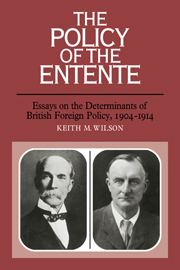Book contents
- Frontmatter
- Contents
- Acknowledgements
- Introduction
- 1 The Poverty of the Entente Policy
- 2 The Politics of Liberal Foreign Policy I
- 3 The Politics of Liberal Foreign Policy II
- 4 The Dissimulation of the Balance of Power
- 5 The Fiction of the Free Hand
- 6 The Invention of Germany
- 7 The Military Entente with France
- 8 The Cabinet's Decision for War, 1914
- Notes
- Bibliography
- Index
3 - The Politics of Liberal Foreign Policy II
Published online by Cambridge University Press: 04 August 2010
- Frontmatter
- Contents
- Acknowledgements
- Introduction
- 1 The Poverty of the Entente Policy
- 2 The Politics of Liberal Foreign Policy I
- 3 The Politics of Liberal Foreign Policy II
- 4 The Dissimulation of the Balance of Power
- 5 The Fiction of the Free Hand
- 6 The Invention of Germany
- 7 The Military Entente with France
- 8 The Cabinet's Decision for War, 1914
- Notes
- Bibliography
- Index
Summary
In February 1911, commenting on an article which had appeared in the French press, Crowe minuted:
The fundamental fact of course is that an Entente is not an alliance. For purposes of ultimate emergencies it may be found to have no substance at all. For an Entente is nothing more than a frame of mind, a view of general policy which is shared by the governments of the two countries, but which may be, or become, so vague as to lose all content. Some therefore of the faults criticised by the Temps are necessarily inherent in any system resting merely on ‘Ententes’.
Nicolson voiced a similar sort of dissatisfaction in 1914: ‘Ententes are all very well for a certain time, but they are most unsatisfactory transactions as they have none of the benefits of an Alliance and are always liable to break down when there is the slightest friction or difference of opinion.’ Although the staff of the Foreign and Diplomatic Services were by no means unanimous on this score, there was a considerable body of opinion within them whose concern to remedy the deficiencies it considered inherent in ententes was manifested in support of their conversion into alliances.
Even before the formal signature of the Anglo-French Agreement Louis Mallet was hoping that it might be the prelude to a closer understanding. In the autumn of 1904 he expressed the wish that ‘a nearer alliance’ could be negotiated at once.
- Type
- Chapter
- Information
- The Policy of the EntenteEssays on the Determinants of British Foreign Policy, 1904–1914, pp. 37 - 58Publisher: Cambridge University PressPrint publication year: 1985



